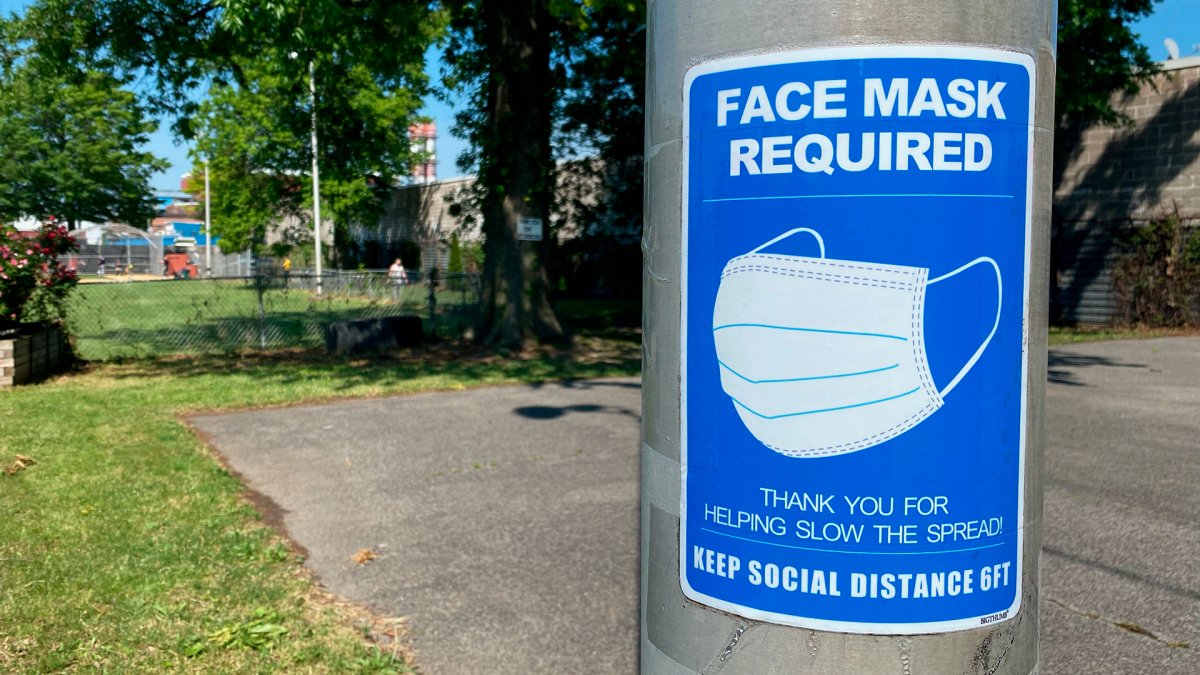
In which areas is the CDC recommending people wear masks indoors? The agency points to its COVID-19 data tracker showing levels of community transmission for each county in the U.S.
Multiple counties in the Chicago area and across Illinois are seeing "substantial" or "high" community transmission of COVID-19, placing them in the categories in which fully vaccinated people should resume wearing a mask indoors, federal health officials say.
The Centers for Disease Control and Prevention updated its guidance Tuesday to recommend that fully vaccinated people should wear masks in indoor settings again in areas of the U.S. that are seeing substantial or high transmission of COVID-19.
The new guidance marked a reversal from earlier recommendations that said fully vaccinated people could remove masks in most settings.
According to the CDC's COVID-19 data tracker, a map showing levels of community transmission for each county in the U.S., at least eight counties in the Chicago area are seeing "substantial" community transmission as of Thursday.
Feeling out of the loop? We'll catch you up on the Chicago news you need to know. Sign up for the weekly Chicago Catch-Up newsletter here.
Those counties include: Will, DuPage, McHenry, Boone, Winnebago, DeKalb, LaSalle and Grundy.
Many of the Illinois' southern and central counties also fall into either substantial, labeled in orange, or high transmission, labeled in red. Some central and northern counties are seeing moderate transmission, labeled in yellow, while just two are colored blue for low transmission.
The agency uses two measures to group U.S. counties into the four levels of community transmission: the number of new cases per 100,000 residents and the percent of COVID-19 tests that are positive over the past week.
If a county has reported 50 to 100 cases per 100,000 residents over a seven-day period or has a positivity rate of 8% to 10%, it falls into the "substantial transmission" tier, while those reporting 100 cases or more per 100,000 or have a positivity rate of at least 10% are labeled as "high transmission." Those are the two groups for which the CDC recommends mask-wearing.
The CDC also said Tuesday that fully vaccinated people also "might choose to mask regardless of the level of transmission, particularly if they or someone in their household is immunocompromised or at increased risk for severe disease, or if someone in their household is unvaccinated."
The Illinois Department of Public Health said Tuesday that it is "fully adopting" the CDC's updated guidance.
IDPH also said the state will follow the CDC's new recommendations for K-12 schools, recommending universal masking indoors among teachers, staff, students and visitors to schools, regardless of vaccination status.
"While data continues to show the effectiveness of the three COVID-19 vaccines currently authorized in the U.S., including against the Delta variant, we are still seeing the virus rapidly spread among the unvaccinated," IDPH Director Dr. Ngozi Ezike said in a statement, noting that COVID cases and hospitalizations continue to increase, especially among those who are unvaccinated against the virus.
"The risk is greater for everyone if we do not stop the ongoing spread of the virus and the Delta variant," Ezike said. "We know masking can help prevent transmission of COVID-19 and its variants. Until more people are vaccinated, we join CDC in recommending everyone, regardless of vaccination status, wear a mask indoors in areas of substantial and high transmissions, and in K-12 schools."
IDPH pointed to the CDC's data on the delta variant showing the variant is considerably more contagious than other strains and spreads more than twice as easily from person to person.
Ezike and IDPH continued to encourage Illinois residents to get vaccinated.
"According to CDC, the Delta variant is causing some vaccine breakthrough infections, but even so, most breakthrough infections are mild, and the vaccines are preventing severe illness, hospitalization, and death," IDPH said.